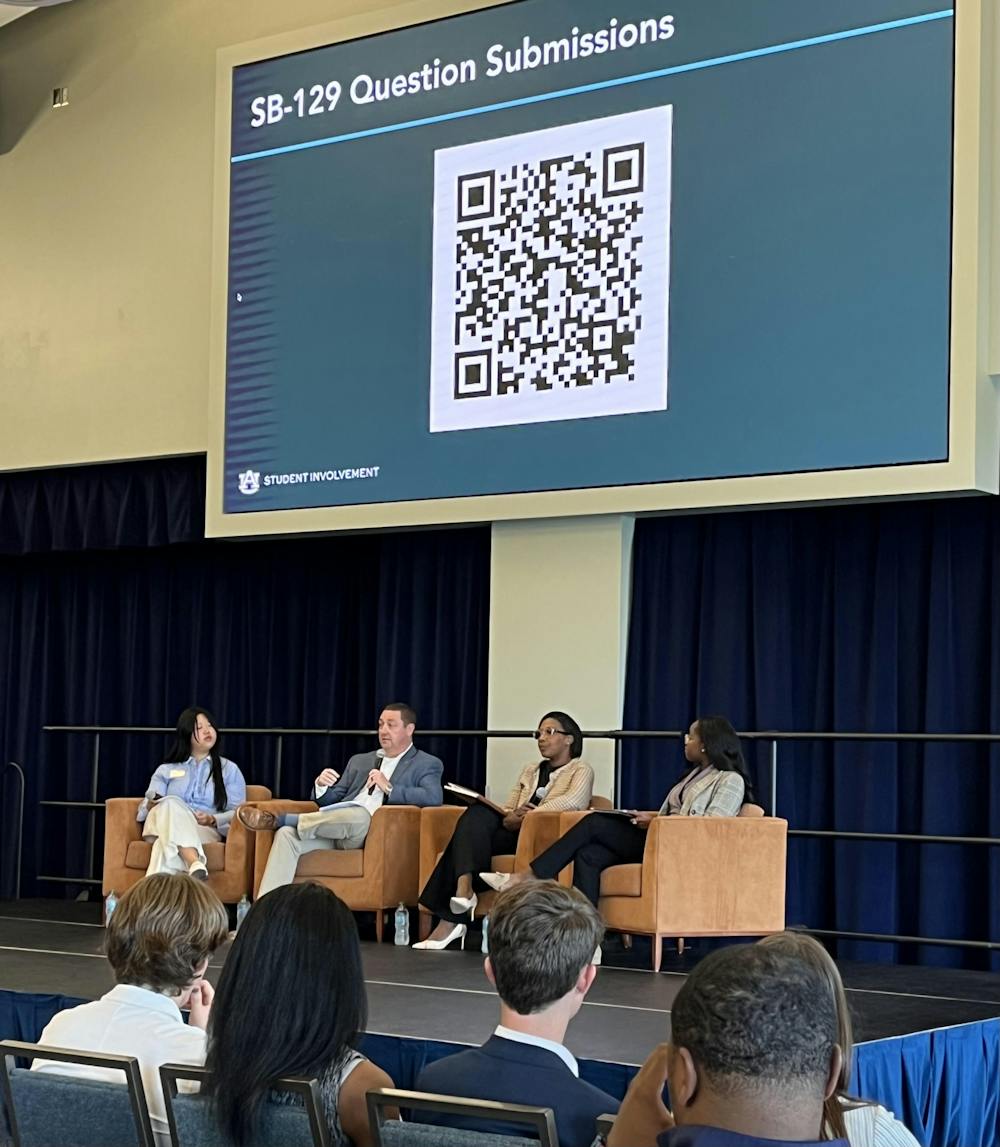A day before the Alabama bill, SB-129, went into effect, Auburn University’s Student Government Association, Black Student Union and International Student Organization held a student roundtable to answer questions about Auburn University's compliance with SB-129.
SB-129, also termed the "anti-DEI" bill, goes into order on Oct. 1. The bill bans state funding for diversity, equity and inclusion programs and prohibits the use of "divisive concepts" within the classroom from either students or faculty.
The Alabama Supreme Court passed the bill on March 7, and Gov. Kay Ivey signed the bill into law on March 20. The roundtable discussion focused solely on student organizations, clubs and spaces, with further insight on how professors are complying with the law in the classroom missing.
SGA President Jack Hilton, ISO President Bren Wells and BSU Vice Presidents of Engagement Lydia Avant and Aliyah Freeman provided opening remarks before beginning the forum. The presidents read out the state definition of SB-129.
The bill summary reads, “Relating to diversity, equity, and inclusion; to prohibit certain public entities from maintaining diversity, equity, and inclusion offices and from sponsoring diversity, equity, and inclusion programs; to provide prohibitions on the promotion, endorsement, and affirmation of certain divisive concepts in certain public settings; with exceptions to provide that certain circumstances are not prohibited; to require public institutions of higher education to designate restrooms on the basis of biological sex; and to authorize certain penalties for violation.”
“We’re hoping that this is a really fruitful conversation where we get to kind of come together as an Auburn Family, and you know, be proactive and recognize that this is something that happened in our state and be a part of that conversation and be a listening ear to each other,” Hilton said.
“We decided this would be a great way for you all to get answers on things you may not know about,” Wells continued. “Although this conversation has been very public about SB-129, having our intimate setting where you can ask questions that have to be answered is really what we wanted for you all today.”
Senior Vice President of Student Affairs Dr. Bobby Woodard and Vice President of Enrollment Dr. Joffery Gaymon participated in answering questions at the forum. None of Auburn University’s legal representatives participated.
Woodard has been with Auburn for 10 years, with Auburn University being the fourth institution he’s worked at.
“My job is to represent the students and be a chief advocate for all 34,045 of our students to administration, to the city, to the Board of Trustees and the other administration on campus,” Woodard said.
“I’ve been at Auburn since 2019 and primarily have responsibility for the enrollment strategy at the university — everything from undergraduate enrollment, the visitor’s center, financial aid, and scholarships as well,” Gaymon said.
Students chose to ask questions in three different ways: anonymously asking questions through a QR code login, asking through a student government representative or walking up to a mic and asking their question.
Once preplanned questions were answered, the representatives initiated an intermission that encouraged students to ask questions to the other student government representatives.
Auburn University's compliance with SB-129
When asked what specific steps Auburn took to comply with SB-129 while maintaining a commitment to diversity and inclusion, Woodard referred to Auburn University President Chris Roberts' statement to the university regarding the bill, where Roberts stated he wants students to be welcomed and engaged at Auburn.
Woodard also stated that Auburn took all programs and services under the Office of Inclusion and Diversity and divided them into offices and organizations that could maintain the programs.
“We're going to be sure to provide services and programs for all of our students on campus, no matter who they are, to make sure they feel welcomed, engaged and valued on our campus,” Woodard said.
Woodard also explained how the changes comply with Auburn’s newest strategic plan, which he stated will be released on Oct. 1.
Gaymon shared that an institutional committee was formed at Auburn to evaluate the effectiveness and explore opportunities to enhance student support. The committee, made up of various campus representatives, aimed to optimize resources, staffing and programming while ensuring students continued to be well-supported.
Why Auburn University chose to dissolve OID
One of the first few questions asked was why Auburn University chose to dissolve the OID instead of renaming the office and realigning the office's goals.
Woodard explained the dismissal of the office occurred to comply with the bill. The inquiry of why not rebranding was brought up, with Woodard further explaining how other institutions who chose to rebrand are now facing further issues.
On July 29, 2024, Auburn University sent a student and faculty-wide email announcing the office’s closure on Aug. 15. Unlike the University of Alabama, University of Alabama at Birmingham and the University of Alabama in Huntsville, Auburn chose not to open up a replacement for the office. The UA system replaced the DEI offices with a Division of Opportunities, Success and Connection Office.
Where OID employees ended up and the future of OID-funded student organizations
Woodard iterated that no faculty working in the OID offices were fired. Some of the employees who worked within the office chose to pursue other opportunities, while others were reassigned to different positions within the university. However, none were demoted or had their salaries reduced. Woodard clarified that the employees had done nothing wrong and that the changes were solely to comply with the law.
Woodard also assured attendees the student organizations funded by the OID would still have the same support offered as last year.
However, when the forum opened to anonymous questions and inquiries about what the support for the groups would be like following the end of the financial year, Woodard explained that he and his team were still looking into how the support would continue or be altered.
This year, Auburn ensured that student organizations previously overseen and funded by the OID will continue to receive funding and advisory support this year under different organizations and offices.
Treasurer Davis, coordinator of Student Belonging & Organization Support, will continue to advise those students in the MC squared organizations.
The future of inclusion spaces, particularly the multicultural centers, is not uncertain. Most will remain as long as anything alluding to DEI is removed.
The Cross-Cultural Center for Excellence space located in the Melton Student Center lost its name but the space will still be in use for all students.
Office of Enrollment's strategy for enrolling underrepresented communities in Alabama
When discussing enrollment for minorities, Gaymon references the 2023 Supreme Court case, Students for Fair Admissions, INC v. President and Fellows of Harvard College, which ruled that race-based affirmative action in college admissions is unconstitutional.
“We actually went through the process, doing a readiness assessment of our practices, actually have spent a good bit of time on thinking about how to be strategic with our efforts, how to really continue to attract a diverse population of students while staying compliant with the federal law,” Gaymon said.
Gaymon mentioned a program Auburn offers called Tiger Takeoff, which is a program that targets students throughout the state of Alabama coming from underrepresented areas.
“A lot of our recruitment initiatives are geared towards going after students within the state. As a land-grant institution, we have a responsibility to enroll students from all corners of the state. And so if you think about it, areas that Auburn has under-enrolled are diverse communities within the state,” Gaymon said.
Auburn University's compliance to gendered bathrooms and the future of on-campus LGBT space
SB-129 also includes a mandate that requires the strict designation of bathrooms based on biological sex. Students asked about how the bathroom rule would be enforced and how Auburn continued to commit to a safe and welcoming environment for transgender students after reconvening.
Woodard responded to that concern stating that in addition to biological bathrooms, there are a number of unisex bathrooms across campus and more will be a part of new buildings such as the new College of Education building.
Concerns over the LGBTQ-friendly space, the Auburn Pride Office in the Haley Center, focused on how the space would be used and how Auburn University would continue to welcome and engage LGBTQ students.
The Auburn Pride Office opened on Oct. 11, 2022. Every summer, the office closed and reopened at the start of the fall semester. However, this year, the space never reopened.
The university is receptive to reopening the space for all; however, Woodard explained the space couldn’t be overseen by any faculty, and the university is still trying to decide how to run it.
At the end of the roundtable discussion, Woodard urged students to remain civil in discourse and to vote in the upcoming election.
“It's OK to disagree with each other, and so to us, as we go through the next four weeks, it’s gonna be very, very critical, and that's because it's the presidential election,” Woodard urged. “It doesn't matter who's running, it doesn't matter who the Republican candidate or the Democratic candidate is, I've been in four states at four institutions, it happens at every single one of them with that presidential election you should vote. Vote for who you believe better lines up with what you want to accomplish in this country and what you believe in.”
Later that evening at the SGA Senate Meeting, a discussion was held regarding renaming the Diversity, Equity and Inclusion Committee to the Access, Engagement and Opportunity Committee. Other grammatical issues were fixed and all mentions of diversity, equity and inclusion were removed. This matter was moved to a future order of business.
The Auburn Plainsman reached out to Woodard for further information. This article will be updated once the information is given.
Do you like this story? The Plainsman doesn't accept money from tuition or student fees, and we don't charge a subscription fee. But you can donate to support The Plainsman.
Michaela Yielding is a senior in journalism currently serving as the news editor. She has been with The Auburn Plainsman since fall 2023.





